English Words in Action, Group M
(a variety of English words which have developed through history and are currently used in our modern age)
Simply click on this banner (or the following link) and you will be on your way to stimulate your brain for greater word comprehension with quizzes based on some of the words in this unit.
2. Etymology: Maudlin is the English development of an alteration of the second name of Mary Magdalene, who was often shown in medieval art as a tearful repentant sinner, or reformed prostitute, who was forgiven by Jesus as indicated in the Bible at Luke vii:37-38.
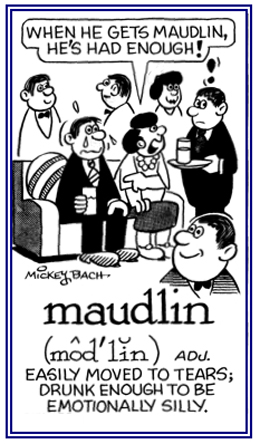
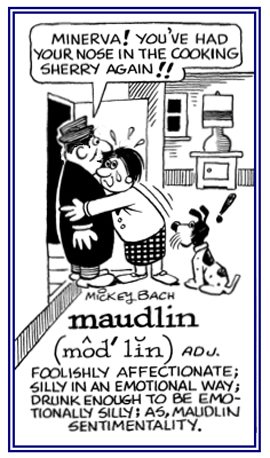
Go to this Word A Day Revisited Index
so you can see more of Mickey Bach's cartoons.
2. Etymology: from Yiddish meyvn, from Hebrew mebîn, active participle of hebîn, "to understand" and is derived the stem of bîn, "to discern".
2. Etymology: from 1867, "a calf" or "range animal" or "stray calf" found without an owner's brand, which referred to Samuel A. Maverick (1803-1870), a Texas cattle owner who became famous for not branding his calves.
Mr. Maverick's cattle were left unidentified and free to roam, and so they were often "adopted" by other ranchers who termed them mavericks, and by the end of the century the term maverick had come to mean "any kind of wanderer or nonconformist".
The sense of being "an individualist" or being "unconventional" was first recorded in 1886, via the notion of being without any kind of control.
2. Etymology: from a Middle English word meaning "maggot"; originally, it meant "nauseated" or "sickly".
Mawkish evolved to mean that which is so overly emotional that it makes people "sick" to hear it.
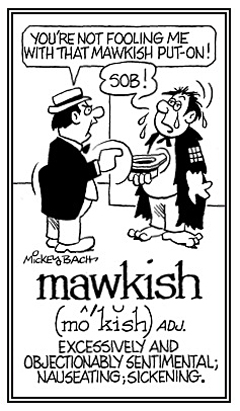
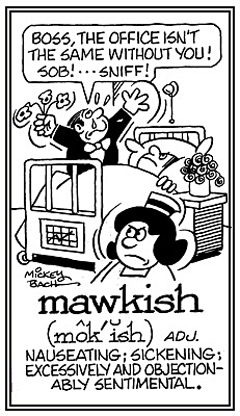
Go to this Word A Day Revisited Index
so you can see more of Mickey Bach's illustrations.
2. A situation of complete chaos and confusion: There was a lot of spirited mayhem on the streets after the football game.
3. Malicious injury that disfigures or disables a person; destruction by nature or someone: The mayhem which the mugging victim suffered left him feeling very insecure and afraid to go out on the streets for awhile.
The hurricane wreaked havoc and mayhem over a large part of the country.
4. Etymology: from 1472, which came from Anglo-French maihem, from Old French mahaigne, "injury"; related to mahaignier, "to maim".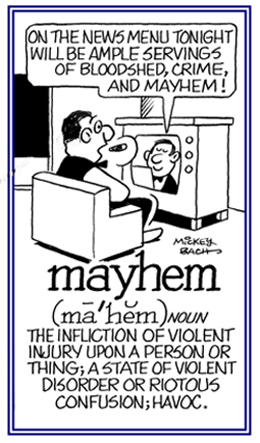
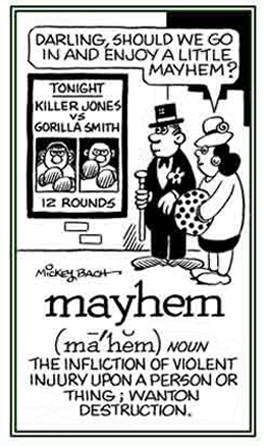
Go to this Word A Day Revisited Index
so you can see more of Mickey Bach's cartoons.
Too many people are having problems surviving on the meager wages that they receive these days.
2. Food that is served and presented to be eaten: The meals that were available to the passengers on the ship provided a variety of choices.
3. Any of the occasions for eating food that occur by custom or habit at more or less fixed times: Adele and David were invited to join their friends for a meal the following evening.
4. Etymologies:
- meal: "food, time for eating", Old English mael, "fixed time, a measure, a meal".
- meal: "ground grain", Old English melu, from West Germanic melwan, "grind".
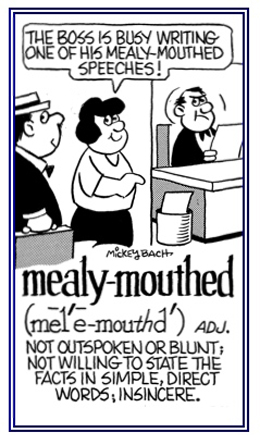
Go to this Word A Day Revisited Index
so you can see more of Mickey Bach's cartoons.
One attack of measles normally develops into a lifelong immunity.
Measles was once a common disease throughout the world where it occurred in epidemics; however, it is not as common now in developing nations because of medical immunizations.
In developing countries, measles is still a common ailment that causes an estimated one million deaths each year; especially, with malnourished children who have no physical defenses against the infection.
- Measles begins with a fever, a runny nose, sore eyes, and coughing.
- After three to four days, a red rash appears; usually, beginning on the head and neck, then spreading downward to cover all of the body.
- After three days, the rash normally begins to decrease and the symptoms of measles starts to go away.
- In the United States, children are normally immunized against measles early in the second year of their lives.
- Pregnant women who have never been immunized against measles should stay away from anyone who has the disease.
The man left the waiter a measly 50 cents for a tip.
Just before the store was being closed for the day, Steve told the clerk that all he wanted was a few measly minutes to pick up a carton of milk.
2. Being infected with an acute infectious disease: Martin was told by the dermatologist that he had the beginning of a measly illness and that he should get home as soon as possible.The memes that Carol's grandmother told of the traveling seamstress, who went from home to home, staying for a few weeks to do all the family sewing, mending, etc., were in fact her life’s story.
Memes can be considered the unit of cultural evolution or a cross between an idea and a gene.
2. A trend, a belief, a fashion or a phrase that is passed from generation to generation through imitation and behavioral replication: The meme that only males wear pants has been debunked in modern times.3. Etymology: coined by Richard Dawkins in his 1976 book, The Selfish Gene, where he stated that memes and memetics are the cultural counterpart to the biological study of genes and genetics.
Using the evolution analogy, Dawkins observed that human cultures evolve via 'contagious' communications in a manner similar to the gene pool of populations over time.
The use of meme suggests or implies the acceptance of the idea that in humans, cultural evolution by selection of adaptive ideas has become more important than biological evolution by selection of hereditary traits.
Memes are like information technology in that they travel back and forth from one concept to another ad infinitum, or endlessly
What lies at the heart of every living thing is not a fire, not warm breath, not a "spark of life". It is information, words, instructions, Richard Dawkins declared in 1980.
Memes emerge in brains and travel outward, establishing beachheads on paper and celluloid and silicon and anywhere else information can go.
Most of the biosphere cannot see the infosphere; it is invisible, a parallel universe humming with ghostly inhabitants. We humans alone among the earth's organic creatures, live in both worlds at once.
The mere mention of the monster in the film filled the children with terror.
Mere and "bare" are often used interchangeably, the difference being that "bare" is more often thought of in a positive sense: He "barely" escaped with his life.
Mere tends to be negative, suggesting that something is lacking: He is merely a clerk in the company.
2. Etymology: from Middle English by way of Latin merus, "pure, unmixed".2. A reference to being based on pretense; deceptively pleasing: In old novels, the villain frequently uses meretricious compliments to seduce the innocent heroine.
Links to all of the groups of English words in action, Groups A to Z.
You may see the bibliographic list of sources of information for these words in action.


